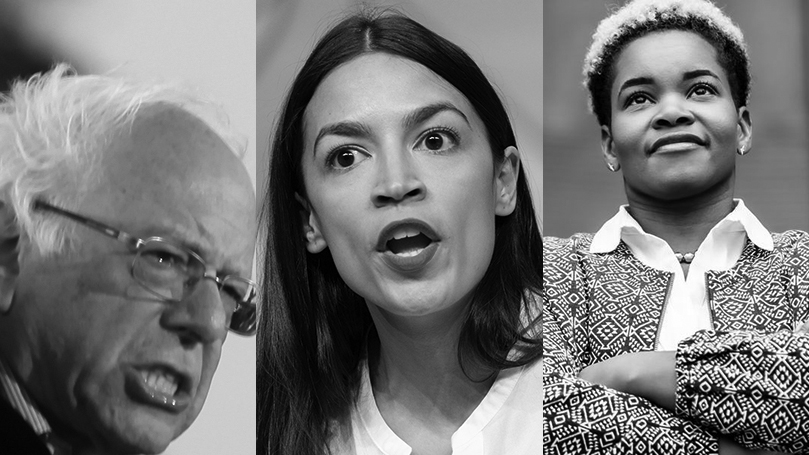
With speed and conviction, India Walton answers “Are you a socialist?” with “Oh, absolutely!”
Walton just handsomely won the Democratic primary for mayor of Buffalo, N.Y., and has faith that socialism will translate for the people. “We have socialism for Tesla,” she says of one of the beneficiaries of the Buffalo Billion deal, a heavily subsidized corporate development plan sponsored by Governor Andrew Cuomo, “and rugged individualism for everyone else. I want to flip the paradigm.”
The incumbent, Mayor Byron Brown, appeared completely unprepared for the outcome. Ms. Walton is a single, African American mother, nurse, union organizer, land trust president, and avowed socialist. The mayor, and some of his allies in the largely Democratic Party–dominated cities and towns in the Buffalo region, refused to concede and plan a write-in campaign, despite the decision of the Democratic Party to support Ms. Walton as the party nominee.
Ms. Walton did not seem at all surprised and appears energized, not subdued by her adversaries. But there is widespread shock expressed in some liberal and progressive — even socialist — quarters that corporate-linked forces in the mayor’s base would resort to this level of resistance, including ugly and racist smears that were immediately broadcast as “legitimate questions” by the media.
The growth of socialism’s appeal is driven by African Americans and women.
Ms. Walton’s campaign and victory are another example of the steady increase in support for socialism among African Americans, women, and youth. Just half of younger Americans now hold a positive view of capitalism — and socialism’s appeal in the U.S. continues to grow, driven by African Americans and women, according to a new Axios/Momentive poll.
On the day when socialists are no longer shocked that bourgeois leaders will resort to any means necessary to crush anything socialist, that will be a sign that American socialism has left behind utopian and grasped more scientific understandings of socialist transformations.
India Walton’s campaign is stunning, but it is only the latest in a growing brigade of “democratic socialists” seeking and winning elective office. Wikipedia documents the undeniable birth and now rapid surge of an important political trend, with over 100 successful campaigns recorded. And their count only includes Democratic Socialists of America–associated candidates, most of whom ran as Democrats, Working Families Party, Green Party, or independent candidates, but avowing democratic socialism as the name of their outlook.
The growth of socialist ideas in public discourse since Bernie Sanders’s 2016 presidential primary campaign shows the immense impact of his very skilled re-introduction of “socialism” into the mainstream (or one of the main streams) of U.S. politics, after decades of repression, marginalization, and silencing of the slightest hint of “socialism.” One of the most important characteristics of Sanders’s initiative was his commitment to the working class as the chief agent of change. In Vermont, he proved in action and in practice to workers that he was for real, not a “bullshitter,” as most of the metal trades workers I knew in that state referred to “super-radicalism.”
However, it was 40 years ago when Bernie began his campaign. He demonstrated that a socialist could effectively govern a city and be an honest representative of his state in the U.S. House of Representatives and Senate way before the last century ended, and he never gave up or apologized for his socialism. But in 2016, his campaign set the country on fire. Outstanding candidates arose, including Alexandria Ocasio-Cortez, and the Justice Democrats, who shaped and deepened the democratic socialist agenda and demonstrated profound political resilience against attacks, including the capacity to go on the offensive on economics, climate change, American fascism, peace and injustice, all while winning re-election.
Corporate America was convinced that a Left-led U.S. labor establishment would be incompatible with its dreams of global expansion.
In one respect, the most astounding achievement of the new wave of heroes under the socialist umbrella is the ending of the marginalization of the U.S. Left. That marginalization has spanned 70 years now. It began with the assault on the CIO and the Communist party, continued under the McCarthy cold-war repressions, and extended through the 1960s upheavals for civil rights and against the Vietnam War, which included numerous murders, assassinations, and trials. The impact was to effectively outlaw mass political organization under a “socialist” or “liberation” banner and turn their protests into “defense committees” against political prosecutions. The Communist Party was the most direct target of the 1950s repression, because of its potent role in the rise of the CIO and industrial organization. Corporate America was united in the conviction that a Left-led U.S. labor establishment would be incompatible with its dreams of global expansion, global resources, and cheap labor.
The arrest and trial of Angela Davis and the murder of Black Panther Party members by FBI-led racist cliques in some city police departments showed the lengths to which reactionary interests will go.
Marginalization has had serious consequences for the U.S. Left. One was that it led to the spread of anarchism in various forms in both politics and ideology.
Without a mass base, political debate on the Left often becomes a contest of abstract, or ideal, conceptions of socialism, and capitalism too. Endless splits and factions erupt as various “rational” but powerless conceptions and declarations on progress compete for attention. Conceptions that may inspire, but for which there is little to verify short of winning elections, and power, and the work of actually implementing new laws and relations.
The chief backward feature of idealized socialism is an inability to unite broad forces.
Why call it anarchism? When it comes to “ideals” we all have our own. Each of us that studies socialist, revolutionary, “true green,” radical democratic, or anti-imperialistic reforms or theories presumably does so based on our personal experiences and values. More importantly, we often view socialism as primarily “rational,” “enlightened” solutions to social conflict and the not infrequent horrors of capitalist development. But the chief backward feature of idealized socialism is an inability to unite broad forces toward a concentrated objective, collectively designed, and implemented. Frederick Engels calls it “Utopian” or bourgeois socialism. The ideals are fine, but without an agency, like a revolutionary class, defeat is certain. Bourgeois forces, like “good” billionaires, are incapable of overpowering bad billionaires, without existential losses to themselves. The only agency capable of leading such change is the working class.
The new socialist campaigns are demonstrating a growing understanding, and they are smashing the 70-year socialist “shut-up and shutdown” era. But why? Why now, after 40 years, does Bernie’s message on the real meaning of political independence break through?
The objective conditions have changed. The 40 years of austerity some call the “neoliberal” era has collapsed under the weight of aggravated inequalities and injustices inaugurated by Nixon and then Reagan. Despite good intentions, and very capable and smart liberal leadership, those abuses could not be reversed by either the Clinton or Obama administration. The power, wealth, and controls of the giant corps, their owners, and “political shop stewards” at federal and state and city levels grow only more pervasive and corrupt. Institutions at every level are experiencing dysfunction, including slowdowns in regulation and responsiveness. The downward trend got noticed, globally, during the 2008 financial crisis, which did serious damage to the U.S. economy. Then comes the Trump fiasco and a genuine fascist threat, accompanied by the pandemic, whose costs are yet to be calculated.
A serious restructuring of the U.S. economy is necessary.
The long-running efforts of leading Democrats to keep the word “socialist” out of the conversation are running out of steam. The remedies of the ’90s and the ’aughts — high-tech expansion, financialization expansion led by a new batch of billionaires with more pro-science ideas — are not working. Which strongly argues that the miseries and contradictions of U.S. capitalism are systematic. In that case, a serious restructuring of the U.S. economy is necessary. Not just from a “rational” point of view, either. Economic forces are real forces, just as real and objective as wind and rain, drought, and flood. The means of life are obtained only through cash and commodities. Structural changes make for revolutionary upheavals because the relations of production, the social divisions of labor, are forcing changes in political and economic institutions.
Our history is marked with at least three of those upheavals: the American Revolution, the Civil War, and the industrial upheaval of the 1930s, which introduced a weakened form of social democracy under Roosevelt in response to mass production technologies, the emerging giant trusts, and the world wars. One could add a fourth: the civil rights upheaval, the struggles for equality in an increasingly multinational and multiracial country — that have not yet passed!
In each case the two-party system of U.S. bourgeois democracy see-sawed the nation away from bad, really bad, choices. Now one of those parties, the Republicans, has given up on democracy, its own implicit confession of the structural, class divides that are again wrecking the union of the 50 states.
The real-life challenges of leadership and governing at every level — grassroots, town, city, county — will transform all the remnants of utopian socialism into what Engels called “scientific socialism.”
American socialism can “come together” in new and powerful ways.
I predict the rise of socialism with American characteristics may end up being the most individualistic, eccentric path of all nations, ours being the most capitalistic of countries. Nonetheless, one need look no further than Congresswoman AOC’s winning defiance, resilience, learning, and resistance to fear, to witness the steel in her posture, to know that American socialism can “come together” in new and powerful ways.
Engels termed this process of coming together, of shedding anarchism and utopianism, alongside illusions about capitalism “fixing itself” — “putting socialism on a real, not ideal, basis.” By that he meant “economics,” in particular the place of economic development in historical materialism — a chief component of Marxism — which holds that the mode of production in any real historical time and place after primitivism, is the primary force driving the division of labor, the social superstructures of property, law, and security, and social class cultural structures as well; that societies, like all “matter” are in motion, have a beginning, an end, a birth, and a death, like the rest of nature.
Leading society as a socialist will require mastering and furthering the development of historical materialism. The Communist Party of the U.S. is the best repository of this theoretical and practical socialist tradition, in my view. Its own struggles for survival and adaptation to very adverse circumstances, and the fact that it still stands, are themselves an act of resilience, an indispensable virtue in the coming storm.
Image: Bernie, Shelly Prevost (CC BY 2.0); AOC, nrkbeta (CC BY-NC 2.0); India Walton (Facebook).


 Join Now
Join Now